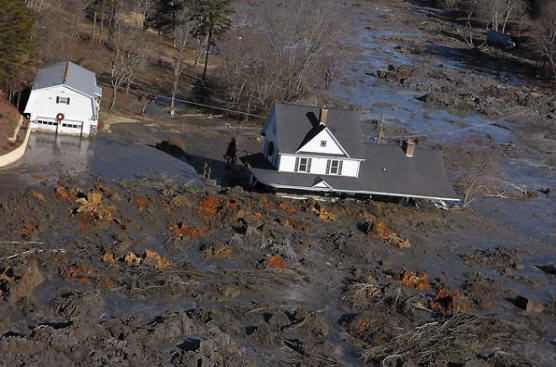HARRIMAN - Workers face "several
weeks' worth of work" to clean up 2.6 million cubic yards of fly
ash dumped across hundreds of acres after a retention pond
collapsed early Monday morning at the Tennessee Valley
Authority's Kingston steam plant.
No injuries have been reported, but one house was swept off of
its foundation and onto the road, and huge piles of a mixture of
water, mud and ash covered Swan Pond Road in Roane County.
"We've got a mess," said Tom Hamby of the Roane County Highway
Department. "The problem is, you don't know what's under this
stuff."
Officials say up to 400 acres of land adjacent to the plant are
under 4 to 6 feet of material. An initial estimate projected
that 2.6 million cubic yards of fly ash were released, said
Laura Niles, an Environmental Protection Agency spokeswoman in
Atlanta. Niles said the pond is reported to contain more than 40
million gallons of water, but she said that was an initial
report. She added that the agency doesn't know how much water
was actually released.
Some of the material made its way into Watts Bar Lake, which
flows past the plant, and water flow through Melton Hill and
Watts Bar dams has been reduced to prevent pollution from the
flood, according to TVA spokesman Gil Francis.
"It's going to take some time to clean up," Francis said. "Crews
are working 24/7."
Francis said 30 pieces of heavy equipment were being brought in,
and about 100 people are involved in the cleanup effort.
Eight to 10 homes were flooded, and 12 residences in all have
been affected by the break. Francis said an undetermined number
of customers are without power.
"I am still in shock," Crystell Flinn, 49, told The Associated
Press. Flinn's house was pushed off its foundation and driven
more than 30 feet onto a road. "I don't think it really has hit
me yet."
The 40-acre pond was used by TVA as a containment area for ash
generated by the coal-burning steam plant, Francis said. An
earthen wall gave way just before 1 a.m., flooding the road and
railroad tracks leading to the plant.
No one was seriously injured or needed to be taken to the
hospital, said Howie Rose, the director of the Roane County
Office of Emergency Management and Homeland Security.
Rose said workers have repaired a ruptured gas line in the area.
Also, he said, water quality testing is under way downstream,
but so far "nothing above normal has been found yet."
Fly ash contains heavy metals. TVA is using a helicopter to
assess the damage, and the agency is formulating a plan for the
removal of the material, Francis said. The goal, he said, is to
"restore the area to the way it was before (the flood)."
The Red Cross set up a shelter Monday in the Roane State
Community College gymnasium to receive residents forced out of
their homes. Six people stayed in the shelter temporarily until
they moved to the Holiday Inn Express in Harriman, where, Rose
said, TVA has arranged for them to stay.
Rose said a train carrying coal to the plant reached the point
on the tracks that was flooded and couldn't go forward or back
up. Officials were able to bring in another engine and back the
train out of the area about 10:30 a.m.
Joey Shanahan, an assistant foreman with the Roane County
Highway Department, said he arrived at the scene about 1 a.m.
and was diverting traffic when the wreck occurred.
"About 2 or 2:30 (a.m.), the train came around the curve and
couldn't get stopped in time," he said.
Three roads into the area have been blocked off, Hamby said,
adding that officials weren't sure about the extent of the spill
until daybreak.
The Environmental Protection Agency was notified, Francis said.
Investigators are still trying to determine exactly what caused
the flood, but he said heavy rains and freezing temperatures may
be to blame. The National Weather Service reported it was only
14 degrees just before 6 a.m. Monday in Harriman.
According to Francis, the area usually receives about 2.8 inches
of rain in December. There's been about 4.9 inches of rain so
far this month, Francis said.
The flood buried and mangled the railroad tracks used by trains
bringing coal to the plant. Rose said TVA has "a few weeks' "
worth of coal on the ground.
Stationed at the base of one of the huge piles of wet fly ash,
Hamby looked out over acres of debris.
"I've been here a long time," Hamby said, "and this is the worst
thing I've experienced."
